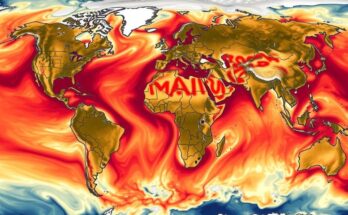The UN Convention on Biological Diversity (CBD) COP16 will take place in Cali, Colombia from October 21 to November 1, 2024. The International Fund for Animal Welfare (IFAW) calls for robust international collaboration to address biodiversity loss and climate change as interconnected crises. Key discussions will focus on aligning national and international efforts, particularly the protection of marine biodiversity and integration of wildlife conservation into climate initiatives. COP16 is viewed as a pivotal moment for meaningful environmental progress ahead of the UNFCCC COP30.
The 16th Conference of the Parties (COP16) to the Convention on Biological Diversity (CBD) is set to take place from October 21 to November 1, 2024, in Cali, Colombia. As global leaders and environmental experts convene for this crucial event, the International Fund for Animal Welfare (IFAW) emphasizes the need for robust international cooperation to address the interconnected crises of biodiversity loss and climate change. Matt Collis, IFAW’s Senior Director of Policy, remarked on the inseparable nature of these two global challenges, asserting, “We can’t solve either the climate crisis or biodiversity loss without addressing the other.” He highlights that COP16 represents a critical opportunity for global leaders to harmonize efforts to safeguard biodiversity alongside combating climate change, thereby laying groundwork for future initiatives. COP16 precedes the landmark United Nations Framework Convention on Climate Change (UNFCCC) COP30, which will necessitate updates to national climate plans. The need for a unified approach is underscored by the recent 2023 COP28 Joint Statement on Climate, Nature, and People, which emphasizes the importance of cohesive efforts. IFAW urges that commitments made in this context be incorporated into the outcomes of COP16, including the high-level segment and the Cali Declaration. Attention is drawn to the imperative of protecting marine and coastal biodiversity due to their essential roles in ecological balance and climate regulation. Marine ecosystems provide critical services such as carbon absorption and climate stabilization, yet they are increasingly endangered by human impact and climate change. “Healthy oceans are the foundation of a healthy planet. They absorb carbon, mitigate climate impacts, and support rich biodiversity,” stated Collis, urging for marine ecosystem protection at COP16. Collis further remarked, “Time is running out to tackle the intertwined crises of biodiversity loss and climate change, but COP16 offers hope. By ensuring that biodiversity and climate efforts are aligned at every level, we can make meaningful progress. The future of our planet depends on it.” An official side event by IFAW titled “Leveraging wildlife conservation and rewilding to supercharge climate mitigation and adaptation” will occur on October 24, at 16:30 COT. This event aims to explore the vital role of wildlife conservation in combating climate change and will introduce guidelines to assist governments in incorporating wildlife conservation into their climate action plans. For more information, visit https://www.cbd.int/side-events/5723. For additional inquiries or to schedule interviews with IFAW experts in Cali, please contact Stacey Hedman at [email protected] or +1 508 737 2558. Further details on CBD COP16 and its agenda can be accessed at https://www.cbd.int/conferences/2024. The complexity and urgency of these environmental challenges necessitate inventive and collaborative responses from both governments and citizens alike. The adoption of modern browsers is recommended for optimal access to relevant information, such as Google Chrome, Firefox, or Safari.
The forthcoming COP16 of the Convention on Biological Diversity, taking place in 2024, is a seminal event in the global effort to grapple with the dual challenges of biodiversity loss and climate change. As nations come together, there is a heightened recognition of the interdependence of these issues, prompting calls for collaborative approaches that recognize their linked natures. COP16 represents an opportunity to set guidelines that will inform the agenda for the subsequent climate conference while simultaneously reinforcing commitments to preserving global biodiversity. As ecosystems face unprecedented threats, particularly in marine contexts, this gathering will spotlight essential strategies for conservation and climate resilience.
In summary, COP16 serves as a crucial platform for international leaders to unify efforts addressing the dual crises of biodiversity and climate change. With strong advocacy from organizations like IFAW, there is potential for significant advancements in global environmental policy. The integration of wildlife conservation into climate strategies, alongside the protection of vital ecosystems, underscores the urgency of coordinated action. The outcome of this conference could be pivotal in shaping future environmental governance, guiding nations towards a sustainable and resilient future.
Original Source: www.ifaw.org




